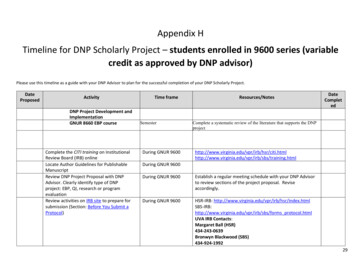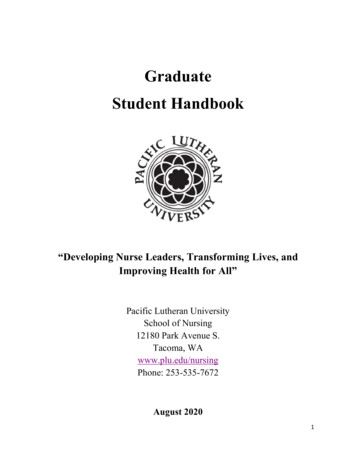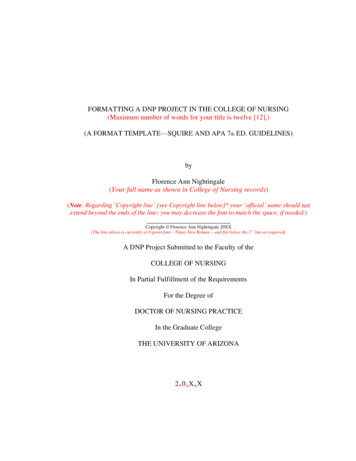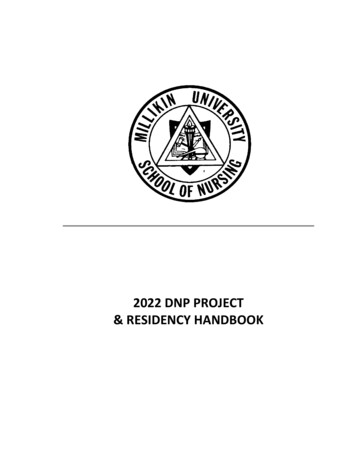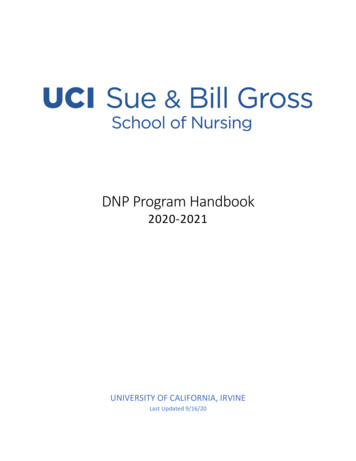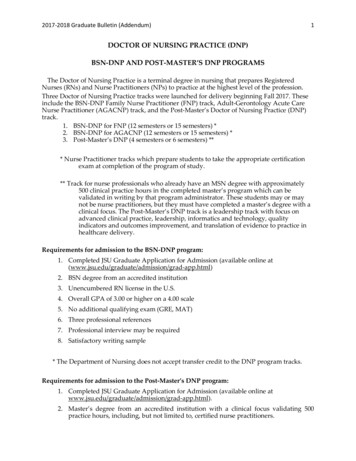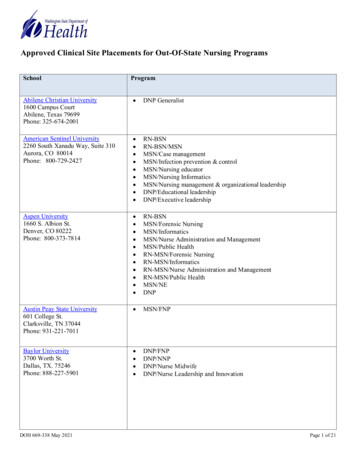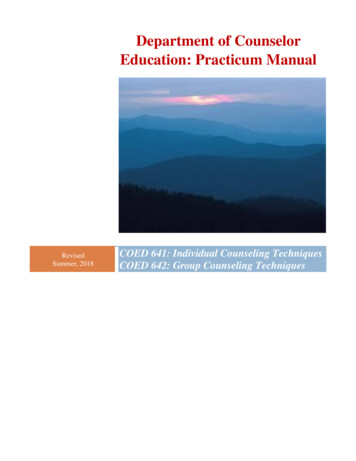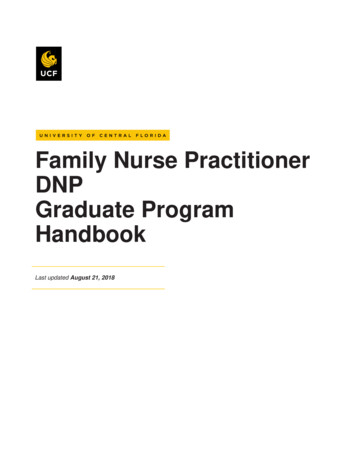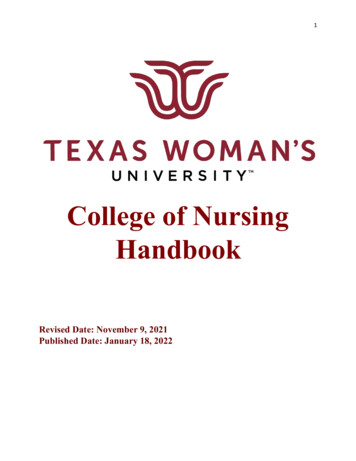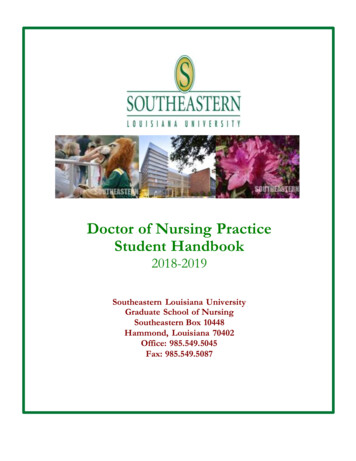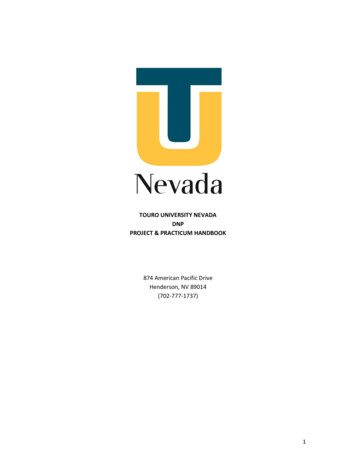
Transcription
TOURO UNIVERSITY NEVADADNPPROJECT & PRACTICUM HANDBOOK874 American Pacific DriveHenderson, NV 89014(702-777-1737)1
Table of ContentsMission and Vision . 3DNP Program Outcomes . 3Leadership Focus . 4DNP Practicum Information . 4Practice Hours Transfer Policy (Appendix E) . 5Practicum Logs . 7DNPV 764 and 756 Meditrek Entries Required Format (Appendix D). 7DNP Project Information . 9DNP Project Overview . 9Examples of DNP Projects . 12DNP Project/Practice Site . 13Assistance with DNP Practice Site . 13Affiliation Agreements . 13Project Resources . 13DNP Project Team . 13Project Course Instructor & Academic Mentor Roles . 14Project Mentor Role . 14Content Expert Role (Optional) . 15Student Role and Responsibilities . 16Additional Project Team Information. 18DNP Project Ethics and Human Subjects Protection . 19Institutional Review Board Process . 19DNPV 764: Leadership Practicum. 20Practicum Activity Examples . 23Examples of DNP Project Topics from the CCNE White Paper . 25APPENDIX A: DNP PROJECT TIMELINE . 31APPENDIX B: DNP Project Team Determination: Quality Improvement Project or Research. 32APPENDIX C: DNP PROJECT FREQUENTLY ASKED QUESTIONS . 36APPENDIX D: MEDITREK ENTRIES REQUIRED FORMAT . 40APPENDIX E: PRACTICE HOURS TRANSFER POLICY . 41APPENDIX F: Practicum Experience Guidelines . 42APPENDIX G: Project Site Mentor Agreement . 45APPENDIX H: DNP Project Paper Template . 522
IntroductionThe following handbook was developed to help guide you through the DNP project process andpractice-based experiences at Touro University Nevada (TUN). It contains the DNP Projectbackground, definitions and procedures that are required for successful completion of your finalproject. This handbook also contains necessary documents and templates that will need to besubmitted throughout development and completion of your DNP project and other practicumexperiences.Mission and VisionVision:The vision of the Touro University Nevada School of Nursing is to foster the development ofprofessional nurses at all levels who excel in practice, research, education, leadership, andcommunity service.Mission:The mission of the Touro University Nevada School of Nursing is to prepare graduates whodemonstrate outstanding nurse leadership at all levels who uphold the values, philosophy, andpractice of the nursing profession and who are committed to care for patients within an ethical,culturally diverse, and evidenced based framework. The programs are student centered and servesociety through practice, research, education, leadership, and community service.DNP Program OutcomesThe graduate will be able to:1. Integrate nursing science, theories, and concepts with knowledge from ethics, thebiophysical, psychosocial, analytical, and organizational sciences as the basis for thehighest level of nursing practice.2.Select appropriate organizational and systems leadership models and theories topromote quality improvement and systems thinking.3.Compile epidemiological, biostatistical, environmental, cultural, and other appropriatescientific data related to individual, aggregate, and population health to determine andimplement the best evidence for practice.4.Design evidence based practice that integrates nursing science and quality improvementmethodologies with the science of other applicable disciplines to improve healthcaredelivery and outcomes.5.Synthesize information systems/technology and patient care technology concepts toimprove and transform nursing practice.6.Critically analyze policy/laws/ethics to develop, evaluate, and advocate for, change thatshapes financing, regulation, and delivery of nursing and health care services.7.Employ effective communication and collaborative skills in the development andimplementation of evidence based nursing practice.3
Leadership FocusTUN’s DNP program focuses on nursing leadership, preparing graduates for administrative and/orleadership roles that focus on aggregates, populations, systems, or organizations. Students do notparticipate in direct patient care through their DNP education. DNP graduates bring theirknowledge and expertise to assist in identifying systems and organizational level problems anddeveloping evidence based health interventions. The ability to perform such activities requirescompetency in organizational assessment techniques in addition to expert level knowledge ofnursing and related biological and behavioral sciences. The timeline for completing the DNPProject is located in Appendix A.DNP Practicum InformationPRACTICUM EXPERIENCE IN THE DNP PROGRAMThroughout the DNP Program at Touro University Nevada (TUN), students are required to enroll in4 different courses which will allow an opportunity to gain practice experiences. An additionalself-study practicum course is available to students who have earned less than 472 postbaccalaureate practice hours prior to this DNP program. The required hours per course areoutlined below:Course TitleTrimester (Full time students)Practice Hours RequiredDNPV 761 DNP Project ITrimester 1144 hoursDNPV 763 Project IITrimester 2144 hoursDNPV 767 Project IIITrimester 3144 hoursDNPV 764 Leadership PracticumTrimester 296 hours*DNPV 756 DNP Practicum (notrequired for all students)After Trimester 11 credit 48 hoursNumber of creditsneeded depends uponMSN practice hourstransferred into the DNP.Note: practice hours will NOT accrue beyond the hours required in each course. Example: 144hours are required in DNP Project I. Student performs 200 practice hours. Only 144 hours willbe counted toward degree completion.In all practice-based courses, students will engage with a Project or Practice Mentor and keymembers from the inter- and intra-professional team in various integrative-practice activities with4
the goal of achieving program outcomes and practice-based learning to prepare them for nursingpractice as a doctoral prepared nurse leader. Students are required to pursue leadership practiceexperiences that will address the DNP Essentials, the TUN DNP Program Outcomes, and lead tomastery of the advanced practice nursing specialty of Scholar-Practitioner and Nurse Leader.During the DNP Project courses, students will carry out a practice-application oriented DNPProject.Students are required to engage in a diversity of practice experiences that relate to all the DNPEssentials, program outcomes, and enable the application of didactic teaching and scholarlyevidence to practice experiences. The Practicum Experience Guideline (Appendix F) outlinesspecific acceptable activities as well as unacceptable activities for practicum experience.Practice Hours Transfer Policy (Appendix E)To be eligible for a doctoral degree in nursing, a total of 1000 post-baccalaureate practice hoursare required. This DNP program has 528 practice hours embedded in the curriculum; these hoursare required as a part of the DNP coursework. Note: practice hours will NOT accrue beyond thehours required in each course. Example: 144 hours are required in DNP Project I. Studentperforms 200 practice hours. Only 144 hours will be counted toward degree completion.Each student may have up to 472 practice hours endorsed from previous graduate work. Transferpractice hours can be evaluated through various methods including:1. An official letter confirming number of practice hours completed at the regionallyaccredited institution the student attended. These hours may be completed during amasters or doctorate degree in nursing.2. Proof of national certification in an area of advanced practice nursing or certification innursing that requires a graduate degree in nursing and additional practice hours.a. Students who meet these criteria are eligible for 472 transfer practice hours.3. Transcript evaluation may be utilized as a method of practicum hour’s evaluation.a. In the case that the transcript provides the number of hours completed, thesehours will be accepted as transfer practice hours.b. If a transcript does not state actual hours of practice, the student will be awarded48 practice hours for every 1 credit hour of practicum or project courses in whichthe student has received a passing grade.The student needs to supply evidence of practicum hour completion. To facilitate this process, anassignment drop-box is in DNPV 760: Introduction to DNP. If no evidence of previous graduatepractice hours is received by the end of DNPV 760, students will need to complete the additional472 hours via enrollment in 10 credits of DNPV 756: DNP Practicum.All students will receive communication from the Director of Graduate Programs regarding theirpractice hours transfer evaluation by the end of Trimester 1.If a student has less than 472 practice hours for transfer, the student will be required to completean Alternate Curriculum Plan which will be evaluated and approved by the Director of GraduatePrograms. To facilitate completion of 1000 post-baccalaureate hours, this plan will include5
enrollment in DNPV 756: DNP Practicum for additional practicum hour completion. Students areeligible to enroll in DNPV 756 at any point after completion of the first trimester of coursework.Please note that a total of 70 post-baccalaureate credit hours are required to obtain a DNPdegree. This DNP Program is 33 credit hours. As a result, a student who graduated with an MSNwith 36 credit hours or less may be required to take additional credits.6
Practicum LogsStudents will be required to log their practicum hours spent in association with their projectthrough the Canvas and Meditrek platforms. To complete the required logs in Canvas, studentsshould utilize the pdf located in each project course named “Practicum Hours Log”. This log shouldbe used by the student throughout the course to record activities as they occur and to obtainelectronic signatures from their PM. The “Practicum Hours Log” must be signed by the PM forapproval of the hours at the end of each module. Once the “Practicum Hours Log” is submitted inCanvas, students should utilize the Meditrek system to complete required documentation ofhours. Hours in Meditrek are not considered for review unless the PM signature has beensubmitted via the “Practicum Hours Log”.Meditrek is the software system utilized to track Practice Hours throughout the DNP Program. Thefaculty course lead will review Meditrek logs at the end of each course module and provideappropriate feedback to students. Logs may be returned to students for revision for severalpossible reasons including insufficient information, activities that do not qualify as practiceexperience, and items requiring further clarification. Logs marked as “accepted” count toward thecourse cumulative total hours. Meditrek software provides the ability to audit hours across theprogram as well as for individual courses. It is the student’s responsibility to monitor the numberof accepted hours as the course progresses.Each student should expect to complete around nine to ten hours each week for a total of 144hours by the end of the course. Most students will achieve these hours through completing theactivities described in the “Practicum Hours Log” for each course module. If alternative activitiesare utilized, this requires approval of the project team. Please see practicum hours guideline foradditional information regarding qualifying practicum hours. At the end of each module, thestudent must have all required hours logged for that module, or a SIP will be issued. At the endof the trimester the student must have 144 logged hours in order to receive a final grade in thecourse. Failure to complete these hours will result in an incomplete grade for the course.DNP 764 and DNP 756Meditrek Required Format (Appendix D)*This format should be utilized for DNP 764 and DNP 7561. Practice site: List the practice site where this activity was performed OR list the practice sitethat this activity was associated with. If you attended an approved conference, please list theconference here.2. Collaboration: Who did you collaborate with to complete this activity? List the names andtitles of the individuals that were involved or that helped you complete this activity. Initials ofnames are acceptable, but the title of the individual should be clear. For example, “J.S. nursingmanager at host site”, would be an appropriate description. These individuals may be fromany discipline if they are associated with your practice activity.3. Supervision: List the name/title of your project or practicum mentor. Must be a registerednurse who holds an unencumbered license in the state where you are performing thepracticum activity. Remember also that you must be licensed in that state as well.7
4. Activity: Describe the activity completed. Activities should be detailed in 1–3-hour blocks.There must be enough detail to legitimize the amount of time entered.5. Rationale: Please justify the need for this activity in one to two sentences. For example, if theactivity was “development of a power point presentation in collaboration with nursingmanager”, the rationale might include, “This power point will be utilized in nursing staffeducation regarding updated sepsis guideline at host site prior to implementation of theguideline”.8
DNP Project InformationDNP Project OverviewThe DNP project reflects the scholarly work completed throughout the DNP program. The projectshould demonstrate the student’s competency in the American Association of Colleges of Nursing(AACN) Essentials of Doctoral Education for Advanced Nursing Practice (AACN, 2006). This workdemonstrates that the DNP student has met and mastered the criteria necessary to be a DNPpractitioner.AACN Essentials of Doctoral Education for Advanced Nursing PracticeThe DNP program prepares the graduate to:Scientific Underpinningsfor PracticeOrganizational andSystems Leadership forQuality Improvement andSystems Thinking1. Integrate nursing science with knowledge from ethics, thebiophysical, psychosocial, analytical, and organizational sciencesas the basis for the highest level of nursing practice.2. Use science-based theories and concepts to: determine the nature and significance of health and healthcare delivery phenomena. describe the actions and advanced strategies to enhance,alleviate, and ameliorate health and health care deliveryphenomena as appropriate; and evaluate outcomes.3. Develop and evaluate new practice approaches based on nursingtheories and theories from other disciplines.1. Develop and evaluate care delivery approaches that meet currentand future needs of patient populations based on scientificfindings in nursing and other clinical sciences, as well asorganizational, political, and economic sciences.2. Ensure accountability for quality of health care and patient safetyfor populations with whom they work. Use advanced communication skills/processes to lead qualityimprovement and patient safety initiatives in health caresystems. Employ principles of business, finance, economics, and healthpolicy to develop and implement effective plans for practicelevel and/or system-wide practice initiatives that will improvethe quality-of-care delivery. Develop and/or monitor budgets for practice initiatives. Analyze the cost-effectiveness of practice initiativesaccounting for risk and improvement of health careoutcomes. Demonstrate sensitivity to diverse organizational cultures andpopulations, including patients and providers.3. Develop and/or evaluate effective strategies for managing theethical dilemmas inherent in-patient care, the health careorganization, and research.9
AACN Essentials of Doctoral Education for Advanced Nursing PracticeClinical Scholarship andAnalytical Methods forEvidence-Based PracticeTechnology andInformation for theImprovement andTransformation of PatientCentered Health CareHealth Care Policy forAdvocacy in Health Care1. Use analytic methods to critically appraise existing literature andother evidence to determine and implement the best evidencefor practice.2. Design and implement processes to evaluate outcomes ofpractice, practice patterns, and systems of care within a practicesetting, health care organization, or community against nationalbenchmarks to determine variances in practice outcomes andpopulation trends.3. Design, direct, and evaluate quality improvement methodologiesto promote safe, timely, effective, efficient, equitable, andpatient-centered care.4. Apply relevant findings to develop practice guidelines andimprove practice and the practice environment.5. Use information technology and research methods appropriatelyto: Collect appropriate and accurate data to generate evidencefor nursing practice. Inform and guide the design of databases that generatemeaningful evidence for nursing practice. Analyze data from practice Design evidence-based interventions Predict and analyze outcomes Examine patterns of behavior and outcomes Identify gaps in evidence for practice6. Function as a practice specialist/consultant in collaborativeknowledge-generating research.7. Disseminate findings from evidence-based practice and researchto improve healthcare outcomes.1. Design, select, use, and evaluate programs that evaluate andmonitor outcomes of care, care systems, and qualityimprovement including consumer use of health care informationsystems.2. Analyze and communicate critical elements necessary to theselection, use and evaluation of health care information systemsand patient care technology.3. Demonstrate the conceptual ability and technical skills to developand execute an evaluation plan involving data extraction frompractice information systems and databases.4. Provide leadership in the evaluation and resolution of ethical andlegal issues within healthcare systems relating to the use ofinformation, information technology, communication networks,and patient care technology.5. Evaluate consumer health information sources for accuracy,timeliness, and appropriateness.1. Critically analyze health policy proposals, health policies, andrelated issues from the perspective of consumers, nursing, otherhealth professions, and other stakeholders in policy and publicforums.10
AACN Essentials of Doctoral Education for Advanced Nursing PracticeInterprofessionalCollaboration forImproving Patient andPopulation HealthOutcomesClinical Prevention andPopulation Health forImproving the Nation’sHealthAdvanced Nursing Practice2. Demonstrate leadership in the development and implementationof institutional, local, state, federal, and/or international healthpolicy.3. Influence policy makers through active participation oncommittees, boards, or task forces at the institutional, local,state, regional, national, and/or international levels to improvehealth care delivery and outcomes.4. Educate others, including policy makers at all levels, regardingnursing, health policy, and patient care outcomes.5. Advocate for the nursing profession within the policy andhealthcare communities.6. Develop, evaluate, and provide leadership for health care policythat shapes health care financing, regulation, and delivery.7. Advocate for social justice, equity, and ethical policies within allhealthcare arenas.1. Employ effective communication and collaborative skills in thedevelopment and implementation of practice models, peerreview, practice guidelines, health policy, standards of care,and/or other scholarly products.2. Lead interprofessional teams in the analysis of complex practiceand organizational issues.3. Employ consultative and leadership skills with intraprofessionaland interprofessional teams to create change in health care andcomplex healthcare delivery systems.1. Analyze epidemiological, biostatistical, environmental, and otherappropriate scientific data related to individual, aggregate, andpopulation health.2. Synthesize concepts, including psychosocial dimensions andcultural diversity, related to clinical prevention and populationhealth in developing, implementing, and evaluating interventionsto address health promotion/disease prevention efforts, improvehealth status/access patterns, and/or address gaps in care ofindividuals, aggregates, or populations.3. Evaluate care delivery models and/or strategies using conceptsrelated to community, environmental and occupational health,and cultural and socioeconomic dimensions of health.1. Conduct a comprehensive and systematic assessment of healthand illness parameters in complex situations, incorporatingdiverse and culturally sensitive approaches.2. Design, implement, and evaluate therapeutic interventions basedon nursing science and other sciences.3. Develop and sustain therapeutic relationships and partnershipswith patients (individual, family or group) and other professionalsto facilitate optimal care and patient outcomes.4. Demonstrate advanced levels of clinical judgment, systemsthinking, and accountability in designing, delivering, andevaluating evidence-based care to improve patient outcomes.11
AACN Essentials of Doctoral Education for Advanced Nursing Practice5. Guide, mentor, and support other nurses to achieve excellence innursing practice.6. Educate and guide individuals and groups through complex healthand situational transitions.7. Use conceptual and analytical skills in evaluating the links amongpractice, organizational, population, fiscal, and policy issues.A major assessment of your learning in this program is accomplished through completion of theDNP Project. All TUN DNP students must complete an integrated evidence-based DNP Project thatdemonstrates a leadership practice (non-research) focus. The DNP final project is an applicationoriented, scholarly document exemplifying the concept of the scholar-practitioner. Project typesmay vary with student preference. Accordingly, project types may include a change project,quality improvement project, practice improvement project, or program development and/ orprogram evaluation. This project is developed sequentially throughout the three trimesters of theDNP program, and is designed to guide, instruct, and keep the DNP student progressing forward.Examples of DNP ProjectsDNP projects are advanced practice focused and are meant to improve a population, health caresystem, or community. Typically, projects emanate from the student’s clinical or professionalnursing practice and involve collaboration with an organization. The DNP project must beperformed in a nursing leadership practice setting. Practice settings may include but are notlimited to hospitals, outpatient clinics, outpatient surgery centers, community health and publichealth. The project should be an evidence-based practice innovation that creates a changeprocess. The DNP project should also include evidence of evaluation through the generation andanalysis of data.Please note that projects in an academic setting such as a school of nursing are not appropriatefor this process.The AACN (2015) states that all DNP Projects should meet the following criteria: Focus on a system or populationShould be centered on changes that directly or indirectly impact healthcare outcomesDemonstrate a plan for future sustainabilityProvide an evaluation of the outcomesServe as a foundation for future nursing practice scholarshipCommon areas of DNP projects include: Quality improvement projectsEvidence-based practiceProgram developmentDevelopment of new policies or revisionPractice change initiativeImplementation and evaluation of a technological innovation to enhance or evaluate care12
DNP Project/Practice SiteThroughout the DNP Program at TUN, students will enroll in 4 different courses which will allowan opportunity to gain practicum experiences. These courses include Leadership Practicum (96hours), DNP Project I (144 hours), DNP Project II (144 hours), and DNP Project III (144 hours).Students are responsible for establishing a practice site for the DNP Project by week 4 of DNPProject I and will use same practice site to complete practice hours in DNP Project II and III (SeeAppendix G). Practice sites may include a diversity of settings including various healthcareorganizations including community centers, acute care facilities, long term care facilities, prisonsystems, school systems, corporations (addressing employee health), non-governmentalorganizations and public health organizations. DNP Project sites can not include academic centersdealing with nursing students at any level.Students enrolled in the Leadership Practicum course may utilize the same practice agreementestablished for their DNP Project or they may also utilize a new site if they choose. Students areasked to verify that a practice site has been established for this course during trimester two (SeeAppendix G). Students may choose to use the same practice site for Leadership Practicum as theyuse for the DNP Project.Assistance with DNP Practice SiteStudents may at times have difficulty establishing a practice site. To assist with this situation, TUNmaintains a current nationwide list of established affiliation agreements that may be utilized aspractice sites for DNP students. If a student wishes to view the list of current affiliationagreements in a specific state, please request this list from the Practicum Placement Specialist.Affiliation AgreementsTouro University Nevada does not require affiliation agreements for DNP Practicum Experiences.However, the practice site may require an affiliation agreement with Touro. If the site requires anagreement it is the responsibility of the student to obtain the agreement. In compliance withthese standards, each student must submit a signed waiver or agreement in the designated weekof the appropriate courses. Should a site require an affiliation agreement, please contact yourcourse lead faculty for more details on this process.Project ResourcesIn completion of a successful DNP project, students will be required to seek out various internaland external resources in their professional community. In some cases, delays in the projecttimeline may occur when a specific resource is unavailable or difficult to obtain. Project due datesmay be adapted as needed to allow for student progression where appropriate.DNP Project TeamThe student will work with an assigned project team throughout their DNP Project. This projectteam will consist of two doctorally-prepared faculty members (a Project Course Instructor and anAcademic Mentor). The student will be responsible for obtaining a Project Mentor and an optionalContent Expert in the project site. Below are qualifications, roles and responsibilities of each role.13
Project Course Instructor & Academic Mentor RolesThe course instru
Throughout the DNP Program at Touro University Nevada (TUN), students are required to enroll in 4 different courses which will allow an opportunity to gain practice experiences. An additional self-study practicum course is available to students who have earned less than 472 post-baccalaureate practice hours prior to this DNP program.
